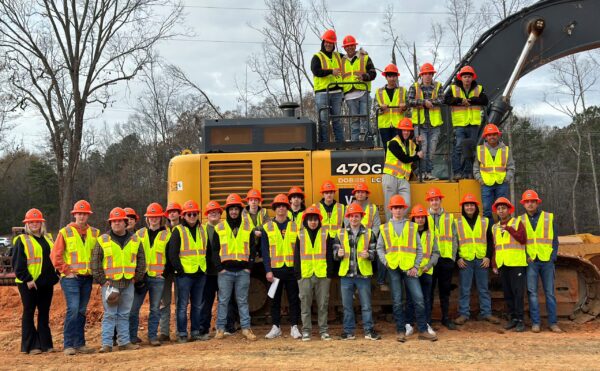
Photo courtesy of Georgia Highway Contractors Association
by Abby Porter, marketing and engagement director, Georgia Highway Contractors Association
Ongoing workforce challenges in the highway construction industry are reaching a critical state as the sector faces a double-edged sword: a rising wave of retirements among seasoned employees and the pressing need to complete extensive roadwork across the nation. Industry forecasts indicate the construction sector must attract nearly half a million new hires to meet the demand expected by 2025.
“There is plenty of road work ahead and we are committed to ensuring there will be plenty of workers,” said David Moellering, president & CEO of the Georgia Highway Contractors Association (GHCA). “We are tackling this issue head on with two initiatives that are attracting a new generation of talented people to our industry.”
The first—the Georgia Road Jobs Campaign—was launched in 2017 and helps existing job seekers understand the diverse career paths available within the highway construction sector. The cornerstone of this digital initiative is a dynamic website where potential candidates can learn about the industry through career exploration tools, view testimonials from employees, and fill out an online questionnaire that serves as a bridge to connect them with hiring contractors. The campaign also organizes annual job fairs across Georgia, facilitating direct engagement between contractors and job seekers.
In 2023 alone, the campaign successfully linked over 8,000 individuals interested in the industry to contractors looking to hire. This success highlights an increasing trend in the effectiveness of the campaign and a rising public interest in exploring career opportunities within the highway construction industry.
Targeting the same goal but a different population, the second initiative—the Heavy Equipment Operator (HEO) Program—helps spark interest in high school students across Georgia. Launched in 2022, it initially rolled out in six schools across the state. By the fall of 2023, it expanded to include nine additional high schools and one technical college.
Supported by state, GHCA, and contractor funding, the HEO Program is a Career, Technical, and Agricultural Education (CTAE) Pathway that blends two key elements: academic curriculum and practical simulator training. The curriculum segment of the program complements the simulators, offering students a deep understanding—the “WHY”—behind their practical tasks. During the simulator training, students engage in various modules, such as Machine Walkaround, Bench & Truck Loading, Trench Box & Pipe, and Trenching, among others, providing them with a hands-on approach—the “HOW”—to operating heavy machinery. Students not only learn from simulators but also gain practical experience by operating actual heavy machinery.
“This hands-on training ensures they accumulate significant ‘seat time’ on equipment—a level of exposure that many industry professionals did not have upon entering the field,” Moellering explained. “Most importantly, students leave the program with both an understanding and newfound interest in the highway construction industry, setting a solid foundation for their future careers.”
The unique industry-education partnership unfolds in three different ways: contractor-led classroom visits, jobsite visits, and the students’ final evaluation or “Capstone Project.” Every participating school is partnered with a dedicated team of contractors from their local area, guaranteeing ongoing and structured interaction.
Moellering notes that the commitment from industry partners in the HEO Program extends beyond just classroom involvement. GHCA has committed significant resources as well, including the allocation of a full-time staff member dedicated to support and coordination. Likewise, the association’s member companies have taken similar steps by assigning full-time employees specifically to high school outreach and recruitment efforts. Additionally, GHCA and its member companies host an annual training program specifically designed for all HEO teachers, further enhancing the educational quality and relevance of the program.
The HEO program attracted 90 students in its inaugural year. Impressively, 45 percent of the graduating seniors in the program went on to accept jobs within the industry. Furthermore, 63 percent expressed interest in pursuing a career as a heavy equipment operator. With the addition of the nine new schools, enrollment in the second year increased to 232, and based on current trends, is projected to climb to 354 students across the existing 16 programs.
“This is the most comprehensive, state-wide operator training program ever undertaken by anyone in the United States. We’re eager to see the new opportunities it brings for high school students and the industry,” Moellering concluded.
The Georgia Road Jobs Campaign and HEO Program mark a significant step towards nurturing a new generation of skilled professionals—and one that can serve as model for other state contractor organizations. Together, these strategies demonstrate a comprehensive approach to cultivating workers ready to meet the industry’s demands.
Topic
Contracting, Members, Workforce Development
Post Type
Transportation Builder Magazine
Related News

A Better Way for the Rubber to Meet the Road
by John Schneidawind, vice president of public affairs, ARTBA Each day on major…

Why AI is Essential to the Future of Heavy Construction
by Kishan Patel, HCSS vice president of product One of the brightest minds…

Unlocking the Promise of AI in Transportation
by Jim Hanson, HDR senior transportation technology lead, and Pedram Oskouie, HDR digital…
